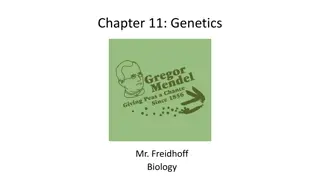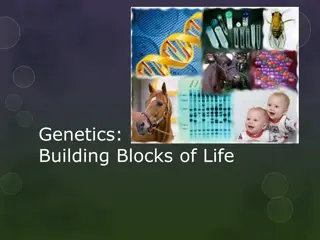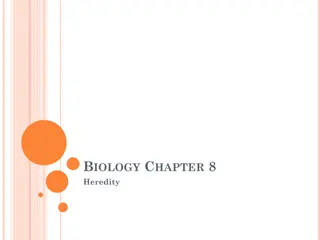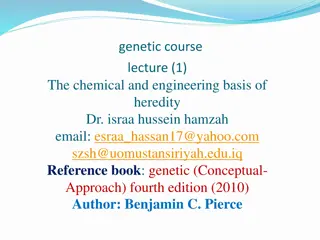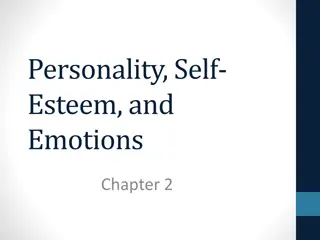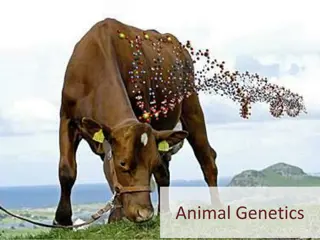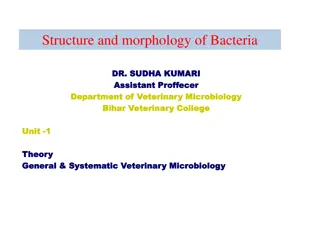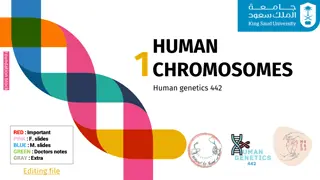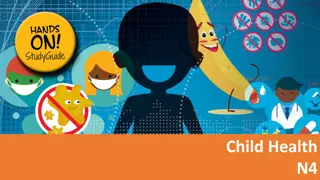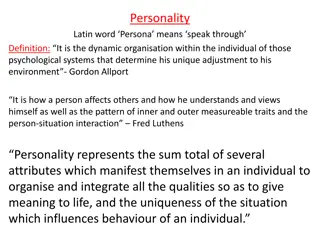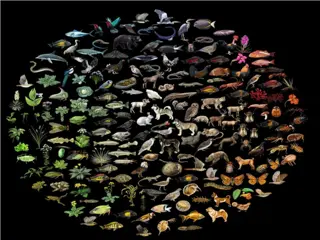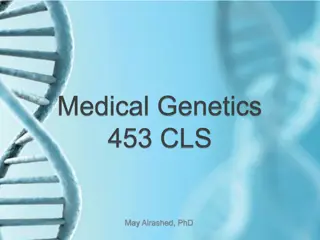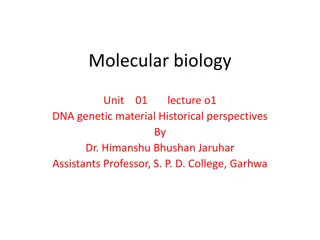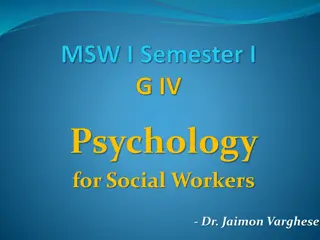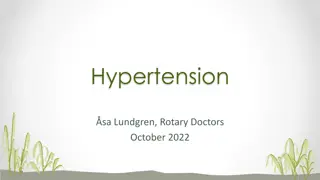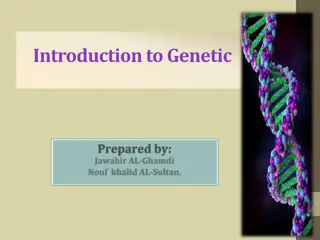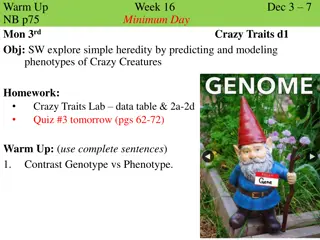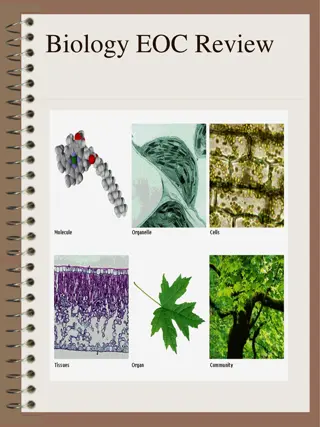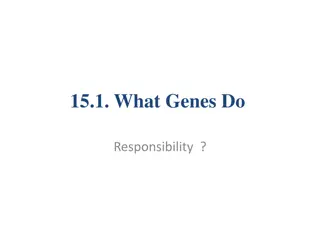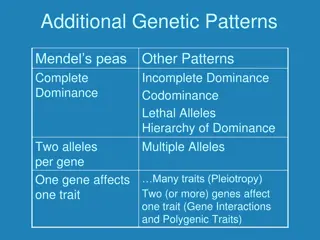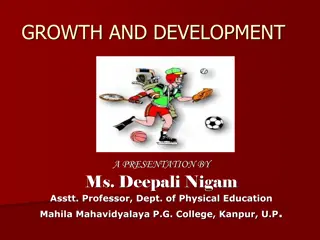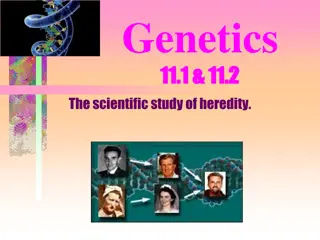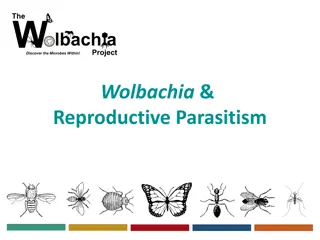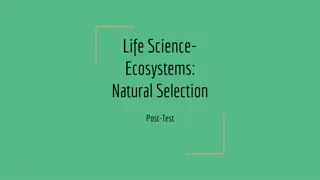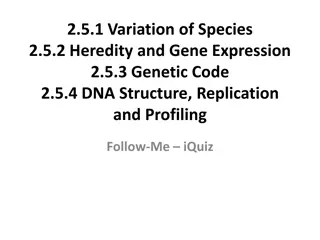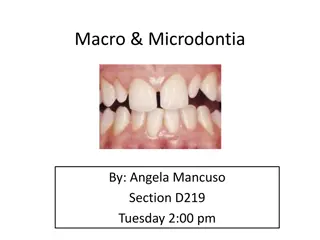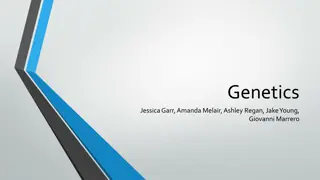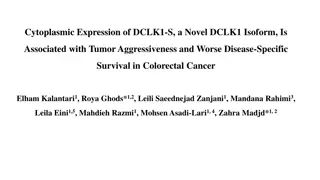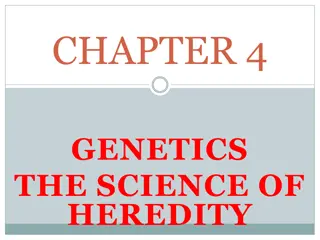Determinants of Health: Understanding Factors Influencing Well-being
Health is a state of physical, mental, and social well-being, free from disease and infirmity. Determinants of health include heredity, environment, lifestyle, and socio-economic conditions. These factors can influence individual and population health outcomes, impacting overall quality of life. Pol
1 views • 31 slides
Genetics: A Comprehensive Overview
Genetics is the study of genes, heredity, and variation in living organisms. This chapter explores key concepts such as phenotypes, genes, alleles, genotypes, and the laws of dominance. Through Punnett squares, the inheritance patterns of traits can be predicted, shedding light on how traits are pas
1 views • 35 slides
Genetics: The Blueprint of Life
Genetics is the study of heredity and how traits are passed from parents to offspring. It involves understanding genetic makeup (genotype) and physical attributes (phenotype) determined by genes. Mendel's laws of segregation and independent assortment explain how alleles and traits are inherited. Nu
0 views • 34 slides
Mendel's Experiments and Principles of Genetics
Delve into the pioneering work of Gregor Mendel, the father of genetics, as he conducted groundbreaking experiments with pea plants, identified key principles of genetics, and introduced the concept of dominant and recessive traits. Explore how Mendel's work laid the foundation for our understanding
4 views • 23 slides
Genetics: The Key Concepts and Applications
Genetics is a vital field of biology focusing on genes, heredity, and genetic variation. This branch of science has deep roots in human history, influencing agriculture and shaping biological disciplines like evolution and developmental biology. Key subdisciplines include transmission genetics, mole
2 views • 26 slides
Personality, Self-Esteem, and Emotions in Mental Health
Exploring the dynamics of personality traits such as extroversion, agreeableness, conscientiousness, emotional stability, and openness to experiences, this content delves into the key aspects of personality, self-esteem, and emotions. It discusses the differences between introverts and extroverts, o
0 views • 12 slides
Animal Genetics: A Comprehensive Overview
Animal genetics is the study of heredity, inheritance of traits from parents to offspring, genetic material like DNA, chromosomes, genes, alleles, and nucleotides. It involves the understanding of chromosomes in different livestock species, DNA as the carrier of genetic information, genes as units o
0 views • 67 slides
Overview of Bacterial Structure and Morphology in Veterinary Microbiology
Bacteria are single-celled prokaryotic organisms with a simple body design. Their structure includes layers such as the extramural layer, surface appendages like flagella and pili, cell envelop with a cell wall and cytoplasmic membrane, and cytoplasmic inclusions. The capsule and slime layer play es
0 views • 21 slides
An Overview of Cell Biology: From Cytology to Modern Studies
Cell biology, also known as cytology, explores cells from various perspectives including physiological, developmental, and evolutionary aspects. Modern Cell Biology delves into the mechanisms of metabolism, heredity, and evolution at the molecular level, involving proteins, RNAs, and DNA. The compar
0 views • 13 slides
Human Chromosomes and Genetics in Health and Disease
Human chromosomes play a crucial role in genetics, ranging from heredity to disease. Cytogenetics studies their structure and behavior, essential for diagnostics like prenatal testing and identifying genetic disorders. The coiling and folding of DNA within chromosomes, along with the mitotic cell cy
0 views • 15 slides
Child Health and Holistic Development
The modules explore the concept of health for young children, defining it as a state of complete physical, mental, and social well-being. It delves into the characteristics of a healthy child, factors influencing health, holistic development, and the team approach to child health involving various p
4 views • 29 slides
Personality: The Dynamic Organization Within Individuals
Personality, derived from the Latin word "Persona," encompasses the psychological systems shaping an individual's unique adjustment to the environment. It influences how a person interacts with others, perceives themselves, and displays a pattern of inner and outer traits. Personality integrates var
4 views • 10 slides
Evolution of Cell Theory: From Observations to Modern Understanding
Robert Hooke and Robert Brown made key observations leading to the cell theory, while M.J. Schleiden, Theodore Schwann, and Rudolf Virchow developed the foundational principles. The modern cell theory expanded to include energy flow, heredity, and cell composition. Protoplasm theory highlighted the
10 views • 20 slides
Genetic Inheritance: Traits, Expression, and Punnett Squares
Explore genetic inheritance through traits, gene expression differences between males and females, and Punnett square analysis. Discover the randomness of genetics, sex-linked, sex-limited, and sex-influenced inheritance, along with practical examples in animal breeding. Delve into genotypic and phe
3 views • 21 slides
H&E Staining in Histology
H&E staining, a widely used histological technique, involves staining cell nuclei blue and cytoplasmic components pink to aid in tissue structure analysis. This method provides essential insights into normal and pathological tissue changes, assisting in diagnoses and further testing decisions. The p
0 views • 7 slides
Evolutionary Contributions of Prominent Scientists in the 19th Century
Charles Darwin, Gregor Mendel, Friedrich Miescher, Aristotle, and Carl Linnaeus were key figures in the 19th century who made significant contributions to the fields of evolution, genetics, DNA discovery, and taxonomy. Darwin proposed the theory of evolution and natural selection, Mendel established
0 views • 20 slides
Historical Perspectives on DNA as Genetic Material: From Mendelism to Griffith's Experiment
Mendelism's rediscovery in 1900 laid the groundwork for understanding heredity, leading to the association of Mendel's factors with chromosomes. The quest to identify the chemical nature of heredity began with Friedrich Miescher's discovery of nucleic acid in 1869. Despite initial confusion between
0 views • 16 slides
Human Behavior: Insights for Social Workers
This material delves into the intricacies of human behavior, exploring factors influencing behavior such as heredity, environment, intelligence, needs, and motives. It covers the concept of human behavior, stages in life from conception to old age, and theories of human development by eminent psycho
2 views • 71 slides
Hypertension: Causes, Symptoms, and Management
Blood pressure is the force of blood against the artery walls. Hypertension, or high blood pressure, can lead to serious health risks like heart disease, stroke, and kidney failure. Primary hypertension may be caused by factors like heredity, obesity, and stress, while secondary hypertension can be
2 views • 20 slides
Genetics Quiz Questions on Heredity and Inheritance
Test your knowledge on genetics with these quiz questions covering topics like Mendelian laws, dominant and recessive traits, gamete formation probabilities, and genetic crosses. Explore concepts such as allelic inheritance, phenotypic ratios, and genetic probabilities in various scenarios. Improve
1 views • 79 slides
Chromosomes: Key Components, Functions, and Significance
Chromosomes, essential in mitosis and meiosis, are condensed forms of DNA vital for heredity, mutation, and evolution. Learn about their structure, role in inheritance, and impact on species development through historical discoveries. Discover the importance of chromosome sets and genomes in gametic
0 views • 38 slides
An Overview of Genetics and Cellular Components
Explore the fundamental concepts of genetics, including cell types, genetic material, heredity, and genetic terminology. Learn about prokaryotic and eukaryotic cells, chromosomes, DNA, genes, and the study of heredity. Discover the significance of genetic information stored in the nucleus and its ro
0 views • 13 slides
The Importance of Heredity and Genetics
Exploring the essential concepts of heredity and genetics, this content delves into the interplay between nature and nurture, the role of genetic code and DNA, and the mechanisms of inheritance. It highlights how genes influence behavior and the distinction between genotype and phenotype. Through vi
0 views • 21 slides
Genotype and Phenotype in Hereditary Traits
Exploring simple heredity through predicting and modeling phenotypes of Crazy Creatures, students are tasked with contrasting genotype and phenotype. The Crazy Traits lab data table is essential for recording alleles and genotypes, aiding in determining phenotypes for 14 different traits. By complet
0 views • 4 slides
Key Concepts in Biology and Chemistry
Exploring the fundamentals of biology and chemistry, including methods for problem-solving, characteristics of life, organic compounds in organisms, and the role of enzymes in metabolism. Learn about cellular organization, reproduction, metabolism, homeostasis, heredity, response to stimuli, growth
0 views • 21 slides
Gene Function and Expression in Molecular Genetics
Investigating gene function and expression is crucial in molecular genetics. Key discoveries by pioneers like Archibald Garrod, George Beadle, Edward Tatum, Linus Pauling, and Vernon Ingram have shed light on how genes are responsible for enzyme synthesis, polypeptide specification, and protein synt
0 views • 29 slides
Genetic Patterns Beyond Mendel's Peas
Explore additional genetic patterns such as incomplete dominance, codominance, multiple alleles, and unique inheritance mechanisms like sex-influenced traits and cytoplasmic inheritance. Discover how genes interact to influence traits beyond Mendel's classic experiments, shedding light on the comple
0 views • 38 slides
Growth and Development in Human Anatomy and Physiology
Growth and development are essential biological processes that involve quantitative and qualitative changes in an individual over time. Growth refers to physical size and shape increase, while development encompasses mental, emotional, and social maturity. Factors like heredity, environment, and beh
0 views • 13 slides
Realism, Regionalism, and Naturalism: Exploring Literary Movements
Defining the literary period of Realism, which portrays life without romantic idealism, focusing on ordinary characters. Regionalism emerges from Realism, depicting specific geographic areas and cultural elements. Naturalism, akin to Realism, studies human beings scientifically and views them as pro
0 views • 26 slides
Genetics: The Study of Heredity and Mendel's Discoveries
Explore the fascinating world of genetics through the scientific study of heredity and the groundbreaking work of Gregor Mendel, the Father of Genetics. Learn about hereditary traits, the role of fertilization, Mendel's experiments with pea plants, and the concepts of genes and alleles that shape bi
0 views • 23 slides
Wolbachia: Reproductive Parasitism and Control Strategies
Wolbachia is a fascinating bacterium known for inducing reproductive parasitism in arthropods, affecting their offspring's sex ratios and survival. This article explores the impact of Wolbachia on different species, genetic crosses, cytoplasmic incompatibility, and vector control strategies such as
0 views • 5 slides
The Legacy of Gregor Mendel: Father of Genetics and Pea Plant Experiments
Gregor Mendel, a monk from the 1800s, conducted groundbreaking experiments with pea plants to study inheritance patterns. By meticulously observing traits like seed color and pod shape, Mendel discovered the principles of heredity and laid the foundation for modern genetics. His work on dominant and
0 views • 33 slides
Natural Selection in Ecosystems: Post-Test Insights
Explore concepts of natural selection in ecosystems through intriguing questions about sharks, clownfish, American black bears, and Galapagos finches. Test your knowledge on heredity and the benefits of sexual reproduction. Gain insights into adaptations, variations, and evolutionary processes in di
0 views • 6 slides
Genetic Concepts: Species Variation, Heredity, and DNA Structure
Exploring genetic concepts such as species variation, heredity, and DNA structure through a quiz format, including topics like differences within populations, genetic codes, DNA composition, and inheritance principles. The questions cover a range of genetic terms and processes, providing a brief ove
0 views • 50 slides
Macro and Microdontia in Dentistry
Macro and microdontia refer to abnormally large and small teeth, respectively. They can be associated with hormonal imbalances like hypopituitarism and hyperpituitarism. In some cases, certain population groups may have naturally larger teeth due to heredity. Dental hygienists play a key role in ide
0 views • 7 slides
Genetics: Concepts of Heredity, Mitosis, Meiosis, and DNA
Genetics is the study of heredity and genetic variations, involving terms like genotype, phenotype, homozygous, heterozygous, dominant, and recessive. Mitosis and meiosis are key processes in cell division, each with specific phases and functions. DNA, or Deoxyribonucleic Acid, stores and transmits
0 views • 14 slides
Kappa Particles Transmission in Paramecium
Research by Dr. Shashikant R. Sitre delves into the transmission of kappa particles in Paramecium, revealing the presence of these cytoplasmic particles in specific strains. The interaction between killer and sensitive strains, controlled by the dominant K gene, sheds light on cytoplasmic heredity a
1 views • 10 slides
Cytoplasmic Expression of DCLK1-S in Colorectal Cancer
Cytoplasmic expression of DCLK1-S, a novel isoform, is linked to tumor aggressiveness and poorer disease-specific survival in colorectal cancer. The study includes assessments of peptide conjugation, immunohistochemical staining in various tissues, and comparison of staining in colorectal cancer usi
0 views • 4 slides
Gregor Mendel: The Father of Genetics and His Pea Plant Experiments
Gregor Mendel, an Austrian botanist monk, laid the foundation for the study of heredity with his groundbreaking work on pea plants in the mid-1800s. By observing traits across generations, Mendel formulated the basic laws of genetics, demonstrating how traits are inherited. His experiments with pure
0 views • 18 slides
Genetics: The Science of Heredity and Gregor Mendel's Contributions
Exploring the field of genetics, this chapter delves into how traits are inherited through genes. Known as the "Father of Genetics," Gregor Mendel's work on filial generations and alleles, both dominant and recessive, forms the basis of genetic research.
0 views • 61 slides

